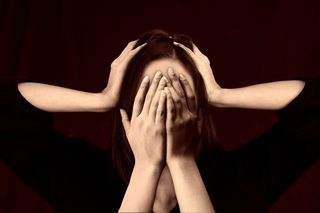Bias
Why We See Racism in Others but Not Ourselves
People have a blindspot that prevents them from seeing their own racism.
Posted February 5, 2020 Reviewed by Chloe Williams

Whenever I teach my college course on racism, I start out the first day by asking students to raise their hand if they are racist.
I bet you can guess how many actually raise their hand. That’s right: Zero.
That isn’t particularly surprising. I mean, who wants to “out” themselves as a racist in front of an entire class of fellow students? But when scientists pose the same question to students whose responses are completely anonymous, the same pattern emerges. This suggests that it isn’t just about social pressure and political correctness. Instead, it seems that people who engage in racist behaviors are simply unwilling or unable to admit their own racism, even to themselves. But why?
The fact that people fail to report their racism even when responses are anonymous got me thinking. Was it possible the reason people who engage in racist behavior don’t label themselves as racist because they essentially have a “mental blindspot” when it comes to their own behavior? What would happen if they saw someone else engage in the same offensive behavior they had? Would they see those behaviors as racist when they were committed by someone other than themselves?
To answer these questions, my graduate students and I designed a clever experiment: At the start of the semester, we had participants fill out an online questionnaire that showed a long list of behaviors and simply asked the respondent if they ever engaged in the behavior before. Some of the items referred to undesirable but non-racist behaviors (“Have you ever lied to get out of a gathering with friends or family?” or “Have you ever worn the same underwear two days in a row?”). Others referred to explicitly racist behaviors (“Have you ever used the N-word to refer to Blacks?” or “Have you ever laughed at another person’s joke about Asian people?” or “Have you ever avoided interacting with a Muslim person out of fear?”).
Months later, these same participants were brought into the lab for what they thought was a totally unrelated study. They were told they would be reviewing the responses of a randomly selected student, but in reality, they viewed their own responses, under the guise of another person’s name.
Now I know what you’re thinking: Did any of these participants see through our ruse and realize this “other person” was really themselves? In truth, only one student out of 131 realized the truth when we asked about it at the end of the study. (Keep in mind that students may complete lots of these types of studies each semester, so it’s easy to forget specific details.) That person was removed from the subsequent analyses.
So, after reviewing this "other person’s" behaviors, participants completed two key questions. They indicated how racist they thought this other person was compared to their average fellow student. And they indicated how racist they themselves were — again, compared to their average fellow student. By comparing these two responses, we were able to subtly assess how racist they thought this other person was compared to themselves.
What did we find? Participants consistently rated themselves as less racist than this other person, even though this “other” reflected their own behaviors. We replicated this effect in two additional studies and also found it held even when we reminded participants that their responses were confidential and they didn’t need to worry about political correctness.
So it appears that when we see other people engage in racist behaviors, we label them as racist. But when we engage in those same behaviors, we don’t label ourselves as racist.
What could account for this asymmetry? More research is needed to answer this question, but one clue can be found in research on the better-than-average effect — the tendency for most people to rate themselves better than the average, which of course makes no sense since most people by definition are “average." This research shows that when people assess their own traits, they rely on peak positive performances (“I’m a good pitcher because I pitched that no-hitter last year”). But when people assess someone else’s behavior, they rely on an average of all performances (“Sure, she pitched that no-hitter once, but her overall pitching record is not that great”).
Something similar could be happening when we make assessments of racism. When we judge ourselves, we may think of the times we behaved in a non-racist, egalitarian way and weigh these instances more heavily when making an assessment.
The key thing to remember is that we all have a blind spot when it comes to judging whether we are racist. So if other people accuse you of being racist (or sexist or homophobic), rather than immediately deny it, you may want to stop and consider what they are seeing that you are not.


